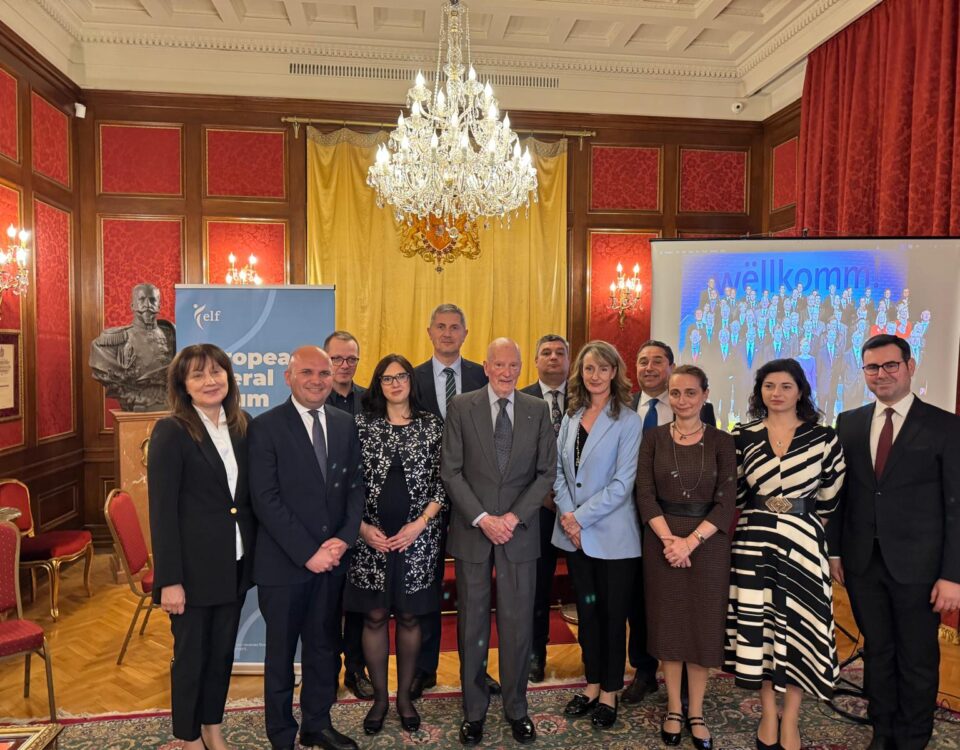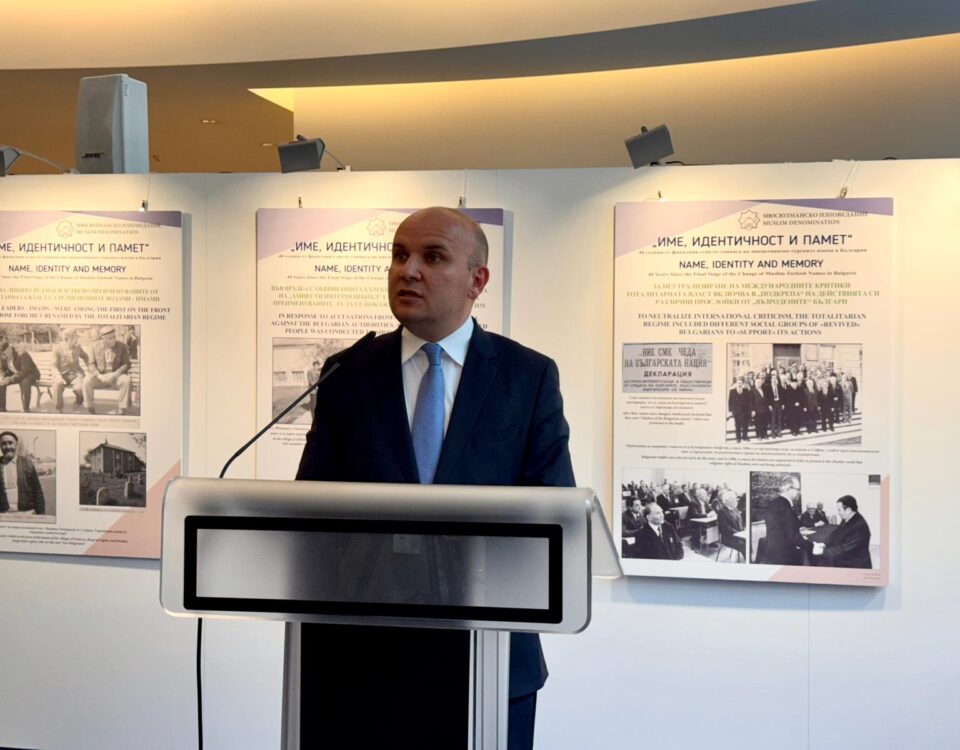
Ilhan Kyuchyuk nominated Zelensky for the Nobel Prize
March 28, 2022
Ilhan Kyuchyuk from Kyiv: We defend the free and democratic choice of each country
April 13, 2022Mr. Kyuchyuk, on 26 April, ALDE, ELF and Atlantic Club are co-organising a forum in Sofia on “The Ukraine Lesson: EU enlargement as antidote to war’. Does it scare you that war may be transferred to the Western Balkan region and the only way to avoid it is to integrate the countries of the region into the EU?
Kyuchyuk: No country in Europe could feel secured because the rule-based order is threatened and all common principles of the UN Charter are violated. Everything has changed since Putin’s invasion of Ukraine. We live in a different, more dangerous world. We simply cannot take stability for granted. In my opinion the best assurance against future war in the Western Balkans is a credible EU enlargement which is based on Copenhagen criteria and on clear roadmap of reforms to be implemented by the candidate country. The only thing that will bring lasting peace to the region is full membership of the countries that make the region. No ifs, no buts! Thus, mobilised us to organise a high-level “EU meets the Balkans” Forum in Sofia on 26th of April and to prove that Western Balkans has become an imminent imperative in view of securing Europe’s safe and prosperous future. There is no doubt in my mind the EU is simply incomplete without the Western Balkans.
Doesn’t it pose a risk to the European edifice to integrate countries that do not meet the membership criteria? Already negative criticisms have been expressed by some older EU Member States about the major enlargement of 2004 for several countries.
Kyuchyuk: It shouldn’t be a surprise if some countries have reservations about who gets to join the club. We are talking about trust between nations. Having said that, I completely reject the idea that Europe would be better off if it hadn’t expanded in 2004 and 2007. Where would these countries and the EU be today, had we gone our separate ways? Let’s not forget that even then Putin was president of Russia with same aspirations towards former Soviet countries. The same goes for my home country of Bulgaria, which joined respectively NATO in 2004 and EU later on in 2007. We know the accession talks are long and sometimes painful. But joining the EU really changes the way your country is run, together with geopolitical and security landscape.
The breach of trust that we have seen in recent years, particularly in Hungary and Poland, comes from the lack of mechanisms we have once a country has joined. We can tell countries they have to adhere to certain rules in order to join, but what happens after?
There is a great deal of discussion about the attempts of some non-EU states to exert influence in the Balkan region. Russia, China, US, and Turkey are seen as countries trying to influence countries in the region for their own interests. How big a problem is this for the region and for Europe?
Kyuchyuk: We cannot be blind to the realities in the ground. The problem of foreign interference of authoritarian regimes exists and has continued to grow in recent years, constituting one of the most pressing threats for the fragile democracies in the Western Balkans. We know that Chinese and Russian investment comes with strings attached. This interference in the society isn’t only about money, it is before all a political influence. It is a long-term strategy of investment with an approval and coordination from the respective governments. The term ‘debt-trap’ diplomacy exists for a reason. Therefore, I believe we should increase understanding of such mechanisms, draw lessons from both the local and EU perspectives and improve EU instruments and actions to respond to similar efforts of authoritarian regimes.
Could these countries have a positive effect on the development of the region, which according to the data is one of the poorest regions in Europe?
Kyuchyuk: Money talks is not a slogan from Hollywood movies. The EU has committed billions of euros to advance sustainable development in the Western Balkans, as well as funds to help deal with the pandemic and the economic recovery. But no investment can beat the long-term benefits that EU membership would bring. We are champions in democracy and high level standards of living. European Union thrives for a reason: it creates a sustainable, socio-economic environment that is based on rule of law and values. This provides certainty. No other model guarantees that.
Russia’s invasion of Ukraine has opened a debate that this is a war between the West and the East. Is this true and if so, where might this tension lead?
Kyuchyuk: Those who try to frame this war into a confrontation between the West and East are wrong. It’s not about geography. This is, however, a war of values. A war between liberal democracy and authoritarianism. We have countries who champion democracy and respect the international multilateral system on the one hand and those who stand up for autocracy and viollence in the other. It is that fundamental a fight. We must do everything we can to support Ukrainian people in their fight for freedom and democracy, whether it is tougher sanctions or providing military support to push back the aggressor. Only then will they have a strong hand in the negotiating table.
Mr. Kyuchyuk, there is something paradoxical about you. You are a Bulgarian MEP and the EU rapporteur for North Macedonia, and it is your country that is blocking North Macedonia’s accession path with its veto. How difficult is this for you and what do you think needs to be done to overcome the problems?
Kyuchyuk: As you know, this is an issue that is close to my heart. It pains me to see such a fundamental issue being delayed between such close neighbours who have had a historical past and want to have a historical future. But ultimately, it takes two to tango. However, the new governments in North Macedonia and Bulgaria marked the beginning of a new process of relations, the results of which I hope to see very soon. To date the biggest issue and the cornerstone for convening the first intergovernmental conference remains the lack of compromise on pending bilateral issues, the so-called 5+1, already 4+1 points. We have a renewed dialogue, that led to a settlement of North Macedonia short name notification to the United Nations and the creation of thematic working groups to strengthen economic ties between both countries. I believe both North Macedonia and Bulgaria should use this window of opportunity and make every effort possible to resolve the outstanding issues by enabling a common future in the EU. The positive example is there and we have seen it with the join commemoration of Gotse Delchev in February and the common media and university projects that the two countries launched recently.
You are a member of a party that largely represents the Turkish minority in Bulgaria and you are a Muslim, if I am not mistaken. Is there really a problem with Muslim countries joining the EU? Is there Islamophobia in Europe?
Kyuchyuk: I do not want to focus on particular ethnic group or religion. The truth is that the hate speech, extremism and populism continue to grow abroad and at home in Europe. Our duty is to continue to fight this phenomenon and the lies of all politicians who undermine our society and democratic values if we want to uphold the fabric of democracy. This is only possible in a society that values freedom, liberty, and truth and this is what my party is doing in Bulgaria since its establishment back in 1990.
What is your vision for Europe? What is what the EU should give more priority and attention to in the future in your opinion?
Kyuchyuk: Russia’s aggression against Ukraine has been a wake-up call for Europe. It showed that for decades, those who delayed decisions, ultimately made mistakes that lead us to where we are today. The EU has to focus on two things:
1) On what it already does best: creating wealth and wellbeing to its population. We must finish the single market and continue to create the conditions whereby our economies can thrive.
2) On what it is only recently begun doing: protecting its citizens and projecting power outside of its borders. A Europe that protects is a Europe that keeps its citizens and its way of life safe from outside threats. Without safety, there is no freedom.
Тази публикация е достъпна и на следните езици: Bulgarian




